How to Improve your marks in Class 9: Tips and Tricks | Mathematics (Maths) Class 9 PDF Download
| Table of contents |

|
| Why is Class 9 Important and Engaging? |

|
| Steps to Excel in Class 9 |

|
| Subject-Wise Study Tips |

|
| Always Stay Focused and Motivated |

|
| Conclusion |

|
Class 9 is often considered an important year in a student's academic journey. It is the beginning of secondary school, where academic expectations increase significantly and students begin to encounter more challenging subjects and complex concepts.
Why is Class 9 Important and Engaging?
1. Introduction to New and Exciting Subjects
- In-Depth Science: Class 9 introduces students to more detailed and advanced topics in Physics, Chemistry, and Biology. For example, students start learning about the laws of motion, atomic structure, and cell biology.
- Advanced Mathematics: The mathematical concepts become more complex, with topics like algebra, geometry, and trigonometry being introduced. This paves the way for critical thinking and problem-solving skills.
- Social Studies: Subjects like History, Geography, and Civics offer a deeper understanding of human societies, world events, and political systems, which helps broaden students' perspectives.
- Languages: Enhance language skills in English and Hindi through advanced grammar, vocabulary, and creative writing, such as poetry and short stories.
2. Foundation for Academic Success
- Board Exam Preparation: Class 9 serves as a foundation for Class 10 board exams. The topics covered in Class 9 are often built upon in Class 10, making it essential to grasp these concepts well.
- Skill Development: Students develop important skills such as analytical thinking, scientific reasoning, and effective study habits that are crucial for higher education.
3. Exploration of Interests
- Elective Subjects: Many schools offer elective subjects in Class 9, allowing students to explore areas of interest such as Computer Science, Fine Arts, or additional languages.
- Extracurricular Opportunities: Students have more opportunities to participate in extracurricular activities like sports, music, debate, and clubs, which helps in the overall development of personality and skills.
4. Preparation for Future Challenges
- Bridging the Gap: Class 9 acts as a bridge between middle school and the more demanding curriculum of high school. It helps students gradually adjust to the higher academic expectations of subsequent years.
- Focus on Career Paths: Students start exploring different career options and may begin to align their academic choices with their career interests. This exploration is crucial for making informed decisions in later years.
Steps to Excel in Class 9
Step 1: Understanding the Syllabus
Understanding the syllabus is like planning a roadmap for your studies. It outlines key topics and helps prioritize study time.
Key Subjects:
- Science
- Mathematics
- Social Science
- English
- Hindi
Access the detailed CBSE Class 9 syllabus for 2024-2025 via the EduRev Infinity Package for a clear study plan.
Class 9 Course
Step 2: Create a Study Timetable
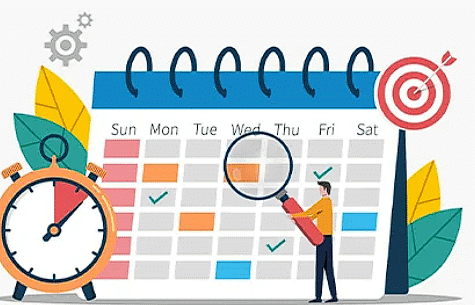
A timetable is like a roadmap, helping students manage time, stay organized, and achieve goals.
Creating a study timetable is crucial as it aids in:
- Managing your time effectively to allocate sufficient time for each subject.
- Staying organized and understanding what to study and when.
- Focusing on critical topics in each subject.
- Studying consistently and avoiding last-minute rushes.
- Enhancing memory retention by revising regularly.
- Reducing stress levels due to having a plan in place.
To save your time and to guide to the right path, we have created subject-wise table time which will help students to understand how to utilize each day.
Step 3: Study NCERT Textbooks & Solving NCERT Questions
NCERT textbooks are the cornerstone of CBSE preparation, offering accurate, expert-written content aligned with the curriculum.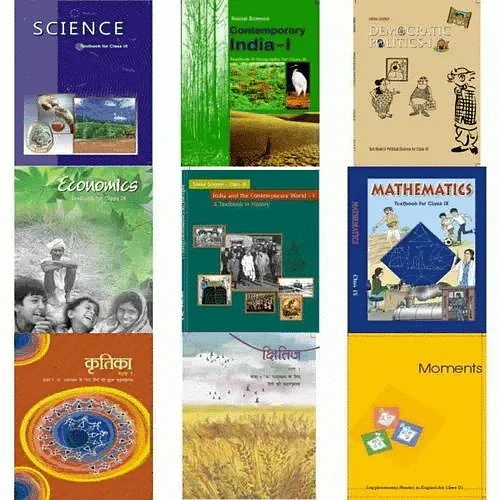
Why NCERT?
- CBSE suggests NCERT books because they are written by experts and follow the official curriculum, providing you with accurate knowledge in a well-organized way.
- Reading textbooks builds a solid understanding of the topics.
- Most CBSE exam questions are directly based on NCERT content.
- Don't forget to do the exercises in your NCERT textbook to test your understanding.
Read NCERT textbooks thoroughly and solve all exercises to solidify knowledge. All NCERT solutions are available at Class 9 course of EduRev.
Step 4: Enhance Learning with Interactive Videos
After reading Textbooks, if students want to understand things even better, they can watch videos about the chapter they studied.
- These videos show you real things about what you're learning. Some videos let you interact by asking questions or solving problems. This makes you think and participate, making learning more active.
- They make the book and class lessons even better by explaining more. In the EduRev Infinity Package, students can find fun and interactive videos for every chapter.
- Videos help them to remember more information and for a longer time, as "What you see you remember more than what you read, it’s a scientific study."
- When you read, you understand a little, but when you see, you understand it more. But again, when you do it by yourself, you grasp it completely, and it’s a very famous saying by Abdul Kalam Azad -
"Learning by reading provides a foundation, by seeing enhances understanding, but it's through doing it yourself that true mastery is achieved."

Step 5: Revise with Notes and Mind Maps
Concise notes and mind maps simplify complex topics and aid quick revision.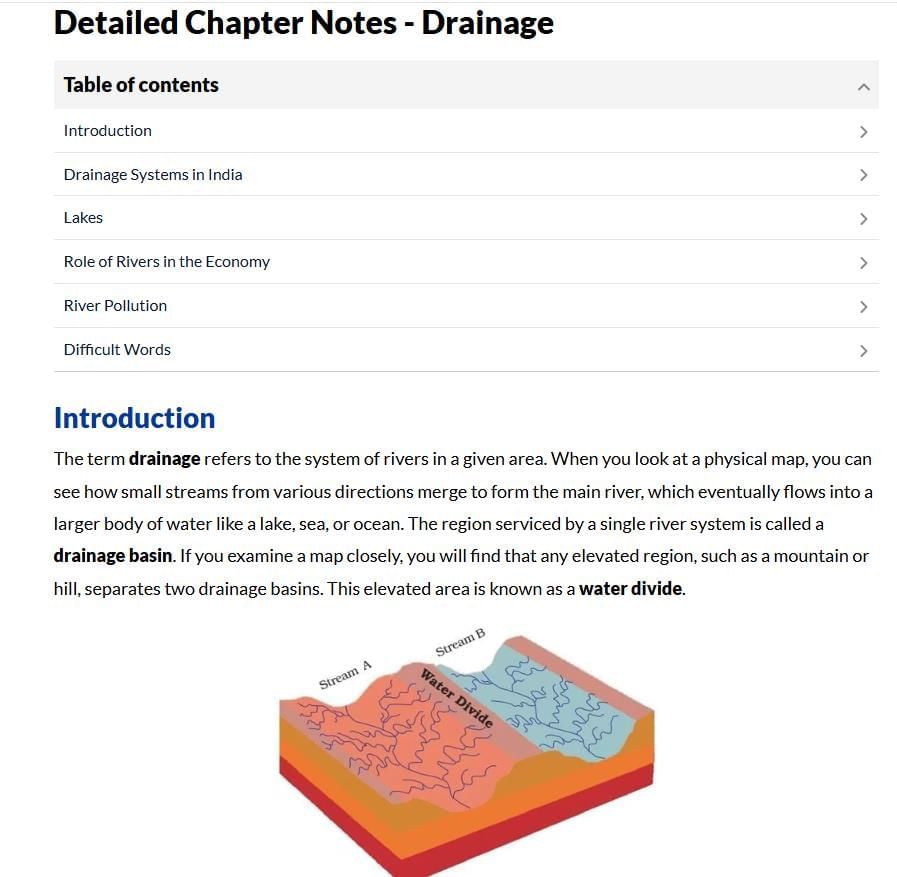
Benefits:
- Taking short notes while you study helps you remember information better.
- It makes complex ideas clearer and helps you quickly review before tests.
- Notes organize what you're learning, making studying easier.
- It's a way to actively engage with your studies and personalize how you learn.
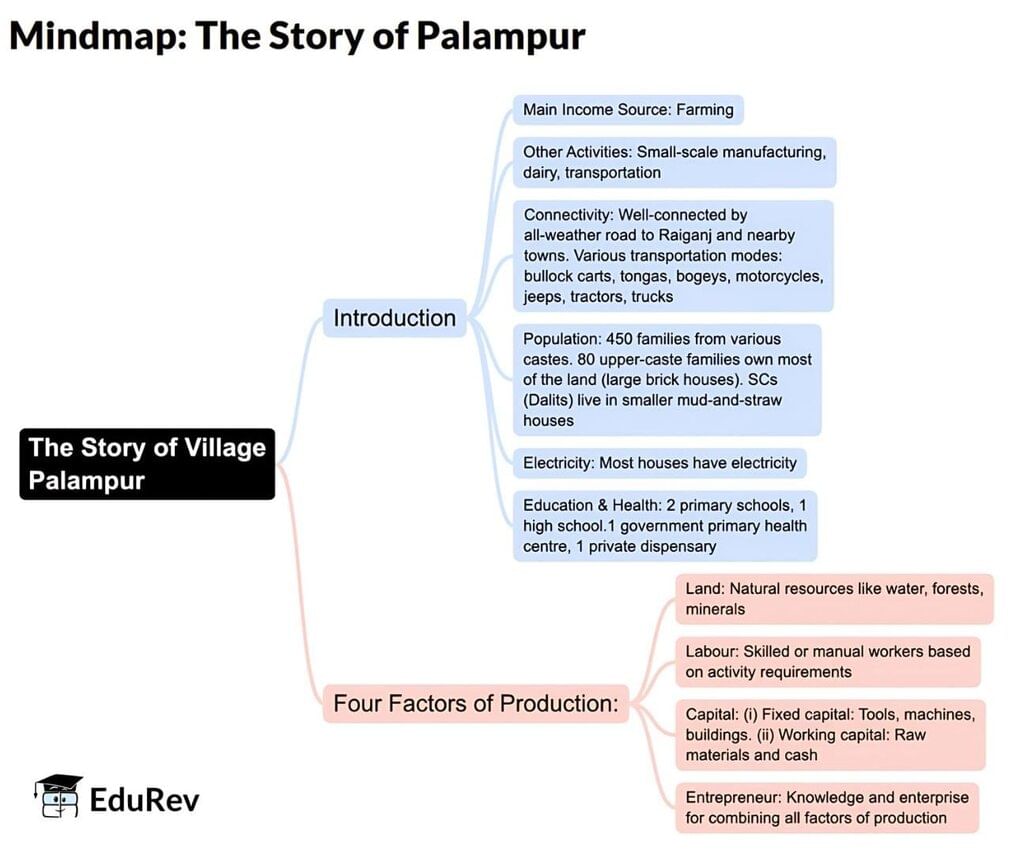
Create chapter-wise notes for quick revisions before tests and exams, helping you recall important information quickly. To save your time and effort we have a complete course consisting of detailed notes for all subjects.
Step 6: Test Your Knowledge
Regular testing identifies strengths and areas for improvement, preparing you for real exams.
- When you take a test, you get feedback on your performance. This helps you know your strengths and areas where you can improve.
- Doing well in tests can make you feel confident and excited to learn more. They keep you motivated.
- Tests prepare you for real-exam situations EduRev offers courses that include tests for every chapter and also providing tests that have multiple-choice questions (MCQs) specifically designed for Class 9.
- These tests can help you in becoming better at answering MCQs accurately.
- When you give a test on EduRev, you will feel exactly the same as during a school exam which will help you analyse yourself even before the real exam.
You can find these tests for each chapter by clicking on the following link: Online MCQ Tests for Class 9
Subject-Wise Study Tips
Subject-wise tips and tricks are specific strategies to help students succeed in different school subjects. These tips make learning easier by giving practical advice for understanding and doing well in subjects like science, math, history, language, and art. They help students study smarter and achieve better results in each area of their schoolwork.
(a) Science
- Understand the Basics: Focus on building a strong foundation in concepts, especially in Physics and Chemistry.
- Use Mnemonics: Use memory aids to remember complex terminologies and processes.
- Make Summary Notes: Write concise notes of each chapter summarizing key points, formulas, and definitions.
- Focus on Diagrams: Practice drawing and labeling diagrams, especially for Biology. This will help you in understanding as well as scoring better in exams.
(b) Mathematics
- Understand Concepts: Mathematics is about understanding the logic behind the concepts. Spend time on grasping the fundamentals.
- Practice Regularly: Consistency is key. Solve a variety of problems daily to build familiarity and confidence.
- Revise Formulas: Keep a separate notebook for formulas and revise them regularly.
- Solve Previous Year Papers: Practice with past question papers to understand the exam pattern and the types of questions asked.
(c) Social Science
- Create Timelines: For history, make timelines of events to help you remember dates and the sequence of events.
- Use Maps: For geography, practice locating places on maps and understanding geographical terms and features.
- Summarize Key Points: Write short summaries for each topic in civics and economics to remember key concepts.
- Connect to Current Events: Relate historical events or civics concepts to current events to make them more relevant and easier to remember.
- Make Flashcards: Use flashcards to memorize important dates, terms, and definitions.
(d) English
- Read Regularly: Develop a habit of reading English newspapers, books, or magazines to improve vocabulary and comprehension.
- Practice Writing: Write essays, summaries, and letters regularly to enhance your writing skills and speed.
- Learn Grammar Rules: Focus on grammar and practice different types of exercises to improve accuracy.
- Expand Vocabulary: Make a list of new words you come across and use them in sentences to remember their meanings.
- Analyze Literature: When studying literature, understand the themes, characters, and settings of the stories or poems.
(e) Hindi
- Read and Write Daily: Practice reading and writing Hindi regularly to improve language skills.
- Understand Grammar: Focus on Hindi grammar and practice different exercises to Ensure correct grammar usage and sentence structure.
- Analyze Literature: Just like in English, understand the themes and characters in Hindi literature.
- Practice Comprehension: Regularly practice comprehension passages to improve your ability to understand and analyze texts.
Always Stay Focused and Motivated
- Set Goals: Define clear, achievable subject-wise goals and keep them visible.
- Follow a Routine: Stick to a consistent study schedule.
- Break Tasks: Divide study material into manageable chunks with short breaks.
- Minimize Distractions: Study in a quiet space and silence notifications.
- Stay Organized: Use planners to track schedules and keep materials tidy.
- Find Motivation: Reflect on your goals and reward small achievements.
- Engage Actively: Participate in class, use flashcards, or teach peers to reinforce learning.
- Practice Mindfulness: Take breaks and engage in hobbies to stay relaxed.
- Seek Support: Join study groups or share goals with family and friends.
- Stay Positive: Focus on strengths, remain optimistic, and visualize success.
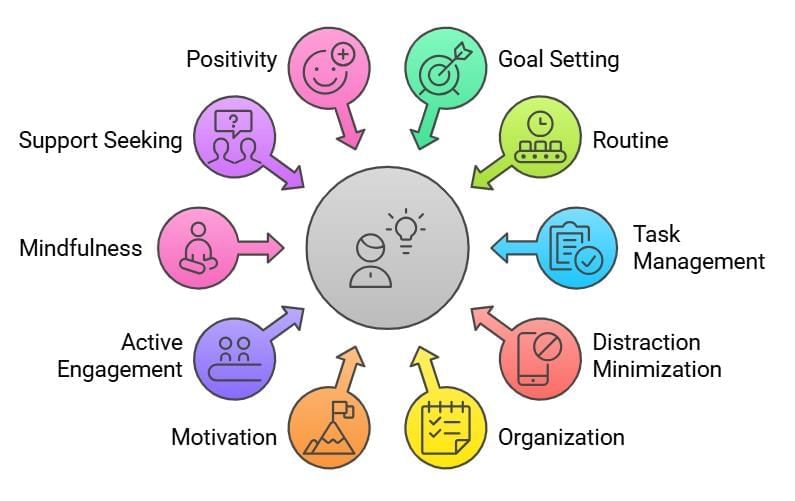
Conclusion
Class 9 is a transformative year that builds the foundation for academic and personal growth. By understanding the syllabus, following a structured timetable, leveraging NCERT resources, engaging with interactive tools, and applying subject-specific strategies, students can excel and prepare for future challenges.
Explore EduRev’s comprehensive resources to support your journey to becoming a topper!
|
40 videos|471 docs|57 tests
|
FAQs on How to Improve your marks in Class 9: Tips and Tricks - Mathematics (Maths) Class 9
| 1. Why is Class 9 particularly interesting and important? |  |
| 2. What are some steps to become a topper in Class 9? |  |
| 3. Can you provide some subject-wise tips and tricks for Class 9 students? |  |
| 4. How can students improve their marks in Class 9? |  |
| 5. How important is it to always stay focused and motivated in Class 9? |  |





















